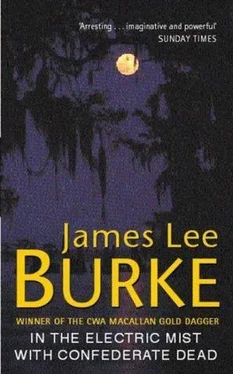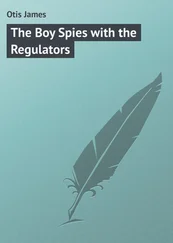"If Lou wanted to buy it, why wouldn't he use his.357?" I said. I scratched at a lead BB that had scoured upward along the wallpaper. "Why would he do it with twenty-gauge birdshot, then botch it?"
"Because he was drunk on his ass. It wasn't an unusual condition for him."
"He was helping me on a case, Doobie."
"And?"
"Maybe he found out something that somebody didn't want him to pass along."
The paramedics lifted Lou's body off the rug, then lowered it inside the plastic bag, straightened his arms by his sides, and zipped the bag over his face.
"Look, his career was on third base," Doobie said, as the medics worked the gurney past him. "His wife dumped him for another dyke, he was getting freebies from a couple of whores down at the Underpass, he was trembling and eating pills in front of the whole department every morning. You might believe otherwise, but there's no big mystery to what happened here tonight."
"Lou had trouble with booze, but I think you're lying about his being on a pad with hookers. He was a good cop."
"Think whatever you want. He was a drunk. That fact's not going to go away. I'm going to seal the place now. You want to look at anything else?"
"Is it true you were an executioner up at Angola?"
"None of your goddam business what I was."
"I'm going to look around a little more. In the meantime I want to ask you a favor, Doobie. I'd appreciate your waiting outside. In fact, I'd really appreciate your staying as far away from me as possible."
"You'd appreciate it-"
"Yes. Thanks very much."
His breath was stale, his eyes liquid and resentful. Then the interest went out of them and he glanced outside at the pale glow of the sun on the eastern horizon. He stuck a cigarette in the corner of his mouth, walked out onto the porch, and watched the paramedics load Lou's body into the back of the ambulance, not out of fear of me or even personal humiliation; he was simply one of those law officers for whom insensitivity, cynicism, cruelty, and indifference toward principle eventually become normal and interchangeable attitudes, one having no more value or significance than another.
In the sink, on top of a layer of unwashed dishes, was a pile of garbage-coffee grounds, banana peels, burned oatmeal, crushed beer cans, cigarette butts, wadded newspapers. The trash can by the icebox was empty, except for a line of wet coffee grounds that ran from the lip of the can to the bottom, where a solitary banana peel rested.
In the bedroom one drawer was open in the dresser. On top of the dresser were a roll of white socks, a framed photograph of Lou and his wife at a Las Vegas wedding chapel, Lou's holstered revolver, and the small notebook with a pencil attachment that he always carried in his shirt pocket. The first eight pages were filled with notes about an accidental drowning and a stabbing in a black nightclub. The next few pages had been torn out. Tiny bits of paper clung to the wire spirals, and the first blank page had no pencil impressions on it from the previous one.
In his sock drawer I found a bottle of vodka and his "throw-down," an old.32 revolver with worn bluing, taped wooden grips, and serial numbers that had been eaten and disfigured with acid. I flipped open the cylinder. Five of the chambers were loaded, and the sixth had been left empty for the hammer to rest on.
I started to replace the revolver in the drawer; instead, I pushed the drawer shut and dropped the revolver into my pants pocket.
On the way out of the apartment I looked again at Lou's blood on the floor. Doobie Patout's shoes had tracked through the edge of it and printed the logo of his rubber heel brightly on the wood.
What a way to exit thirty-seven years of law enforcement, I thought. You died face down in a rented garage apartment that wouldn't meet the standards of public housing; then your colleagues write you off as a drunk and step in your blood.
I looked at the smudged letters SI again. What were you trying to tell us, Lou?
Doobie Patout locked the door behind me when I walked outside. A red glow was spreading from the eastern horizon upward into the sky.
"This is what I think happened, Doobie. You can do with it what you want," I said. "Somebody found Lou passed out and tossed the place. After he ripped some pages out of Lou's notebook, he put Lou's twenty-gauge under his chin."
"If he tossed the place first, he would have found Lou's.357, right? Why wouldn't he use it? That's the first thing you jumped on, Robicheaux."
"Because he would have had to put it in Lou's hand. He didn't want to wake him up. It was easier to do it with the shotgun."
His eyes fixed on mine; then they became murky and veiled as they studied a place in the air about six inches to the right of my face. A dead palm tree in the small yard clattered in the warm morning breeze.
It was Saturday, and I didn't have to go to the office, but I called Rosie at the motel where she was living and told her about Lou's death.
At noon of the same day Cholo Manelli drove a battered fire-engine-red Cadillac convertible down the dirt road by the bayou and parked by the dock just as I was headed up to the house for lunch. The left front fender had been cut away with an acetylene torch and looked like an empty eye socket. The top was down, and the back seat and the partly opened trunk were filled with wrought-iron patio furniture, including a glass-topped table and a furled beach umbrella.
He wore white shorts and a green Hawaiian shirt with pink flamingoes printed on it. He squinted up at me from under his white golf cap, which was slanted over one eye. When he grinned I saw that an incisor tooth was broken off in his lower mouth and there was still blood in the empty space above his gum.
"I wanted to say good-bye," he said. "Give you something, too."
"Where you going, Cholo?"
"I thought I might go to Florida for a while, take it easy, maybe open up a business like you got. Do some marlin fishing, stuff like that. Look, can we talk someplace a minute?"
"Sure. Come on inside the shop."
"No, you got customers around and I got a bad problem with language. It don't matter what I say, it comes out sounding like a toilet flushing. Take a ride with me, lieutenant."
I got into the passenger's seat, and we drove down to the old grocery store with the wide gallery at the four-corners. The white-painted iron patio furniture vibrated and rattled in the back seat. On the leg of one chair was the green trademark of Holiday Inn. Cholo parked in the shade of the huge oak tree that stretched over the store's gallery.
"What's with the furniture?" I said.
"The owner wanted me to take it when I checked out. He said he's been needing some new stuff, it's a write-off, anyway, and I'm kind of doing him a favor. They got po'-boys in here? It's on me."
Before I could answer he went inside the store and came back with two shrimp-and-fried-oyster sandwiches dripping with mayonnaise, lettuce, and sliced tomatoes. He unwrapped the wax paper on his and chewed carefully on one side of his mouth.
"What's going on, Cholo?" I said.
"Just like I said, it's time to hang it up."
"You had some problems with Baby Feet?"
"Maybe."
"Because you called an ambulance for me?"
He stopped chewing, removed a piece of lettuce from his teeth, and flicked it out onto the shell parking lot.
"Margot told him. She heard me on the phone," he said. "So last night we was all having dinner at this class place out on the highway, with some movie people there, people who still think Julie's shit don't stink, and Julie says, 'Did y'all know Cholo thinks he's Florence Nightingale? That it's his job to take care of people who get hurt on ball fields, even though that means betraying his old friends?'
Читать дальше












